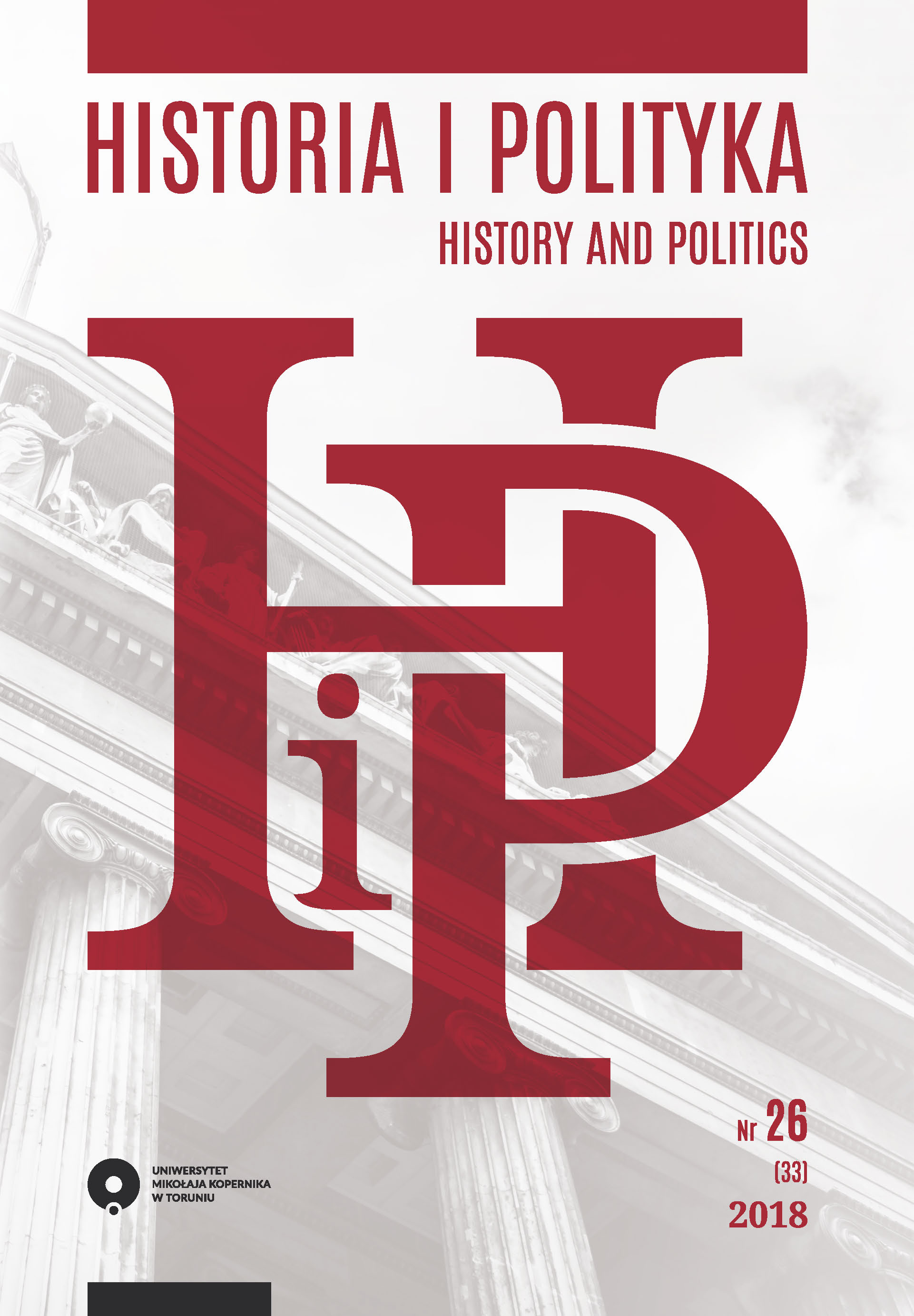Russia Under the Pyramids. The Significance of Russia-Egypt Relations Under Vladimir Putin
DOI:
https://doi.org/10.12775/HiP.2018.028Słowa kluczowe
Russia, Egypt, USA, Putin, Sisi, Trump, pyramidAbstrakt
The subject of our interest is to analyze the significance of Russia-Egypt relations undervVladimir Putin. The main purpose of our studies is to present the most important conditions and dependencies that characterize political, economic and military relations between the two countries.
In the beginning, we would like to discuss the history of relations between the abovementioned states, dating back to the times of the USSR. The key issue is the description of diplomatic relations between the two countries under the rule of Gamal Abdel Nasser in Egypt and Anwar Sadat, after which for many years there had been a freeze in mutual relations up to the turn of the 21st century. In the next part of the discussion we present the most important goals and assumptions of political relations between Moscow and Cairo, implemented from the beginning of Putin’s rule in 2000 and by subsequent ruling elites in Egypt. We are mainly talking about Egypt gradually turning away from the United States, Russia’s slow return to the Middle East, the conflicts in Libya, Syria and tensions between the rulers of Egypt and Qatar, which harbors followers of the Muslim Brotherhood persecuted by Cairo. In addition, we examine the importance of economic issues in bilateral relations, focusing on the growing cooperation in the field of energy. We also describe the significance of military aspect and the related maritime doctrine of the Russian Federation, in which Egypt was mentioned as one of the most important partners of Russia in the Middle East.
In the summary, we present possible forecasts for the future in mutual relations, at the same time trying to answer the question of how real is the significant weakening of the Egyptian-American relations and Egypt’s turn to Russia in the future.
Bibliografia
Andrew, C., Gordievsky, O. (1999). KGB. Warszawa: Bellona Publishing House.
Bielicki, P. (2016). Communication Strategy in The Policy of The Russian Federation. Arcana, 1/2(127/128), 67–86.
Bielicki, P. (2017). Persian Gulf Statescut Off Diplomatic Relations with Qatar. Retrieved from: http://geopoliti.org/?p=715.
Chęć, M. (2014). The Bear Is Back. Egypt-Russia Relations After 2011. Retrieved from: http://bliskiwschod.pl/2014/10/niedzwiedz-wraca-nad-nil-stosunki-egipsko-rosyjskie-po-2011-r/.
Concept of the Foreign Policy of the Russian Federation Approved by President of the Russian Federation V. Putin on 12 February 2013. Retrieved from: http://archive.mid.ru//nsosndoc.nsf/1e5f0de28fe77fdcc32575d900298676/869c9d2b87ad8014c32575d9002b1c38?OpenDocument.
Crude Oil. Quotations of Raw Materials. (2017). Retrieved from: https://www.bankier.pl/ inwestowanie/profile/quote.html?symbol=ROPA.
Dergham, R. (2016). Egypt Bets on Strategic Relations with Trump and Putin. Retrieved from: http://www.huffingtonpost.com/raghida-dergham/egypt-bets-on-strategic-r_b_13407926.html.
Dymer, A.M. (2017). Russia’s Policy Toward The Biggest Countries of North Africa. Retrieved from: https://www.pism.pl/files/?id_plik=23256-.
Russia and Egypt Committed to Counter US-Saudi Policy in Mideast. (2017). Retrieved from: https://pl.sputniknews.com/opinie/201705315567442-Egipt-Rosja-opor-polityka-USA-Rijad-Syria/.
Egypt Says “No” to Russia. There Will Be No Miltary Base. Retrieved from: http://www.tvn24.pl/wiadomosci-ze-swiata,2/rosja-egipt-baza-wojskowa-w-sidi-barrani,684430.html.
Fursenko, A., Naftali, T. (2007). Khrushchev’s Cold War. Warsaw: BellonaPublishing House
Gaddis, J. (1998). We Now Know: Rethinking Cold War History. Warszawa: Amber Publishing House.
Ginat, R. (1991). The Soviet Union and Egypt 1947–1955. London: London School of Economics and Political Science, University of London.
Halawa, O. (2013). Friends Again? Retrieved from: https://www.madamasr.com/en/2013/11/27/feature/politics/friends-again/-.
Hawk, J., Deiss, D., Watson, E. (2016). The Geopolitics of Russia-Egypt Relations. Retrieved from: https://southfront.org/the-geopolitics-of-russia-egypt-relations/.
Issaev, L.M. (2017). Russia and Egypt. Opportunities in Bilateral Relations and The Limits of Cooperation. Retrieved from: http://sharqforum.org/2017/01/26/russia-and-egyptopportunities- and-limits-for-cooperation/.
Kissinger, H. (1996). Diplomacy. Warszawa: Philip Wilson Publishing House.
Mickiewicz, P. (2016). The Black Sea Region and Mediterranean Sea in Russia’s Policy. The Yearbook of International Security, 3, 67–81.
Muczyński, R. (2015). New Maritime Doctrine of Russia. Retrieved from: http://www.nowastrategia.org.pl/nowa-doktryna-morska-rosji/.
Nosseir, M. (2017). Egypt-Russia Relations: Reviving The Unstable. Retrieved from: http://english.alarabiya.net/en/views/news/middle-east/2017/01/26/Egypt-Russia-relations-Reviving-the-unstable.html.
New, Better Suez Canal. Historic Investment Reaches End of Project. (2015). Retrieved from:
Purat, A. (2014). The Importance of the Muslim Brotherhood in Egypt’s Policy and Events of the Arab Spring in 2011. Przegląd Politologiczny, 1, 215–229.
Russian Specialists Operate in Libya. Additional Points for the Kremlin in its Fight with The West. (2017). Retrieved from: https://wiadomosci.wp.pl/rosyjscy-specjalsi-dzialaja-wlibii-kolejne-punkty-dla-kremla-w-walce-z-zachodem-6100980942378113a.
Russian General Calls for Preemptive Nuclear Strike Doctrine Against NATO. Retrieved from: http://www.themoscowtimes.com/business/article/russian-general-calls-for-preemptive-nuclear-strike doctrine-against-nato/506370.html.
Russian-Egyptian Relations Experiencing Renaissance, Three Problems Remain. (2017). Retrieved from: http://enterprise.press/stories/2017/05/31/russian-egyptian-relationsexperiencing-renaissance-three-problems-remain/.
Sukhov, M. (2017). Egypt, Russia Cover Lots of Common Ground in Recent Meeting. Retrieved from: http://fares.al-monitor.com/pulse/originals/2017/06/egypt-russia-commong-ground-meeting-lavrov.html.
Przybylska-Maszner, B. (2011). The Arab Spring. Poznań: Scientific Publishing House of the Faculty of Political Sciences and Journalism.
The Geopolitics of Russia-Egypt Relations. (2016). Retrieved from: https://southfront.org/the-geopolitics-of-russia-egypt-relations/.
The Suez Crisis – And A Different Side of Nasser. (2013). Retrieved from: http://adst.org/2013/07/the-suez-crisis-and-a-different-side-of-nasser/.
Tisdall, S. (2012). Egypt Underlines Iran’s Isolation at Non-Aligned Movement Summit. Retrieved from: https://www.theguardian.com/commentisfree/2012/aug/30/egypt-irannon- aligned-movement-summit.
Wahid, H.M. (2017). The United States And the Future Of Egyptian-Russian Relations. Retrieved from: http://www.hoover.org/research/united-states-and-future-egyptianrussian-relations.
Wołoszański, B. (2003). This Terrible Century. Warszawa: Świat Książki.
Zubok, V. (2010). A Failed Empire: The Soviet Union in the Cold War from Stalin to Gorbachev. Kraków: Jagiellonian University Publishing House
Pobrania
Opublikowane
Jak cytować
Numer
Dział
Licencja
Uniwersytet Mikołaja Kopernika w Toruniu respektuje prawo do prywatności i ochrony danych osobowych autorów.
Dane autorów nie są wykorzystywane w celach handlowych i marketingowych. Redaktorzy i recenzenci są zobowiązani do zachowania w poufności wszelkich informacji związanych ze złożonymi do redakcji tekstami.
Autor, zgłaszając swój tekst wyraża zgodę na wszystkie warunki i zapisy umowy licencyjnej (określającej prawa autorskie) z Uniwersytetem Mikołaja Kopernika w Toruniu.
Statystyki
Liczba wyświetleń i pobrań: 753
Liczba cytowań: 0



